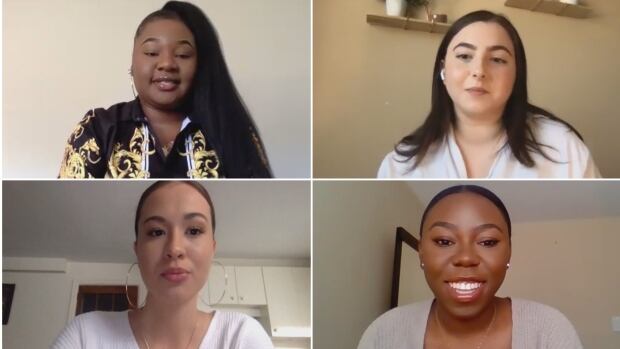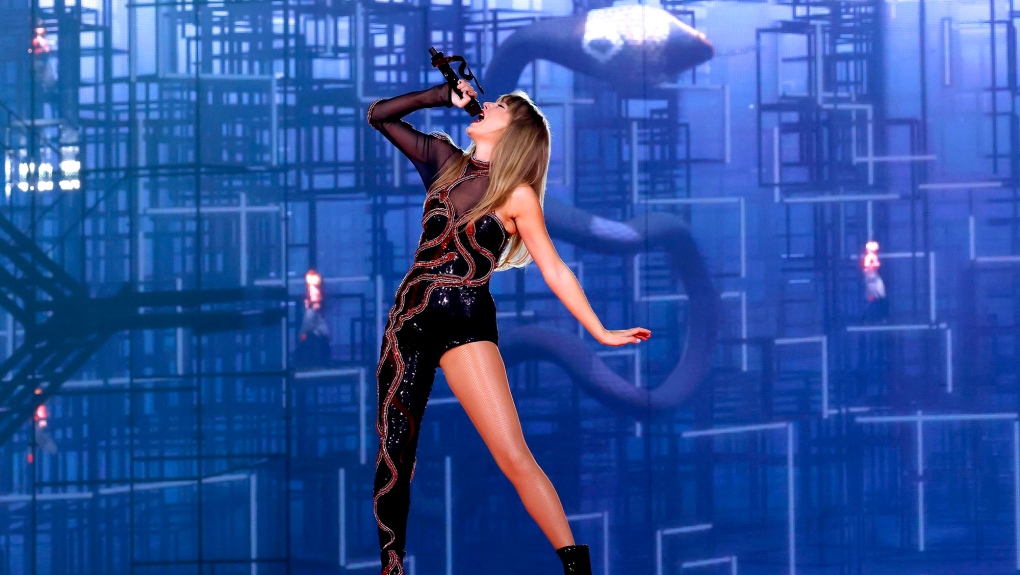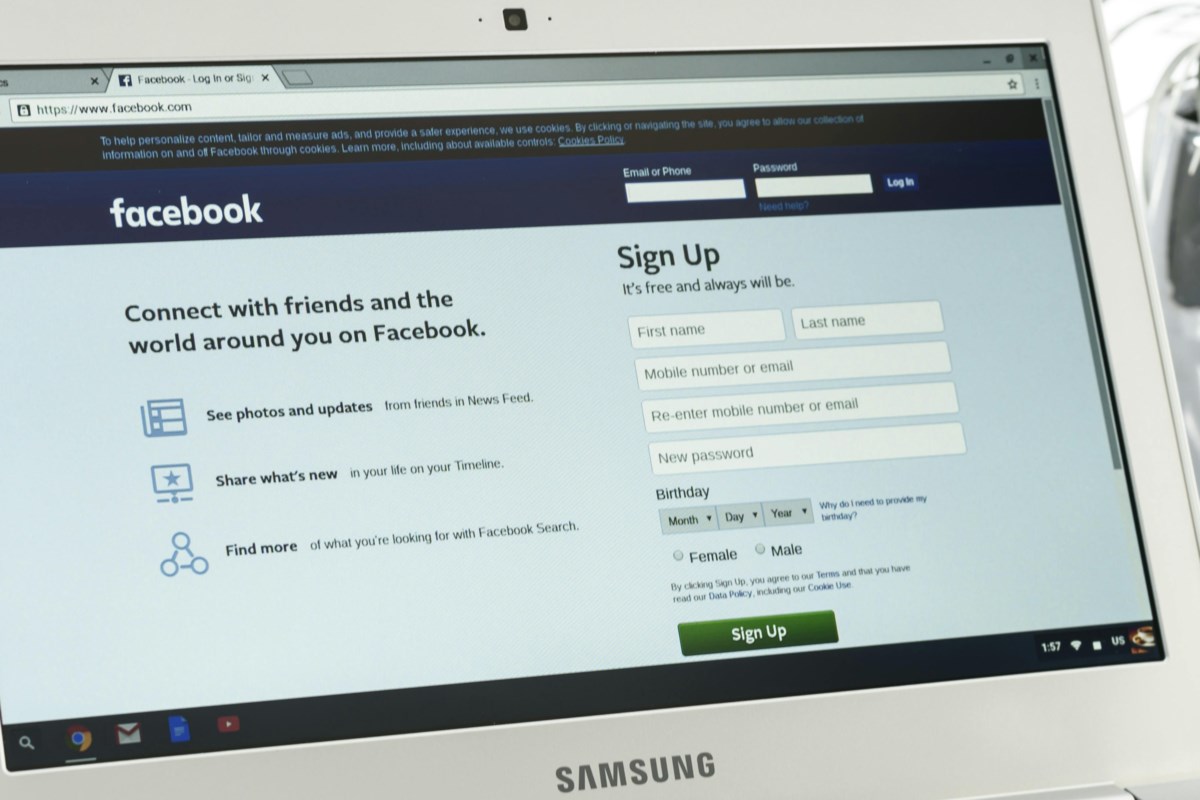Media
These journalism grads wanted Canadian media to do a better job on Black stories. So here's what they did – CBC.ca

When it comes to journalism, the people who decide what stories we see and hear matter just as much as the stories themselves.
That’s the message from a group of four young, diverse graduate students at Ryerson University in Toronto.
They’re behind a petition to push their school to launch a course on how to responsibly report on stories affecting Black Canadians — one that dismantles stereotypes and explores how various tropes have had a hand in perpetuating racial bias.
Breanna Xavier-Carter, Tiffany Mongu, Rosemary Akpan and Sara Jabakhanji launched the online petition about a week ago, racking up thousands of signatures — and managed to get their school to act.
“I’m hoping that other young Black journalists will feel like they belong. A lot of times when you don’t see yourself in the program or see people coming to speak to you that are already in the industry, you’re going to feel imposter syndrome,” Akpan told CBC News.
Incoming journalism students can now thank these four graduates for the newest addition to the school’s curriculum: “Reporting on race: The Black community in the media.”
This week, the chair of the school’s journalism program, Janice Neil, announced Ryerson would act on the petition by creating a course specifically aimed at reporting on Black Canadians to launch this fall.
PETITION FOLLOW UP: As a result of my wonderful friends & I’s petition, Ryerson School of Journalism will now offer “Reporting on Race: The Black Community in the Media” — in the Fall to 3rd/4th year undergraduate students + MJ2 graduate students. <a href=”https://t.co/mJYLn3voyD”>https://t.co/mJYLn3voyD</a>
—@mongumnews
In their petition, Xavier-Cartier, Mongu, Akpan and Jabakhanji point to a 2010 study out of Ryerson University that examined the representation of visible minorities in leadership roles in Toronto, including in the media.
“In media organizations, only 4.8 per cent of board members and executives were visible minorities. Visible minorities were also under-represented among newspaper columnists and as hosts and experts on supper time broadcasts,” the study found.
That’s despite Toronto being one of the most diverse cities in the world, with 42.8 per cent of its citizens identifying as visible minorities at the time of the study.
“The result of this is Black stories, perspectives, and voices aren’t being given the platforms they equally deserve. Their own narratives are being published by the white writers, editors and producers that make up mainstream newsrooms, ultimately showing the systemic racism which builds most of our institutions,” the students wrote in their petition.
WHO MADE HOUDINI VANISH?: Hip-hop world mourns after up-and-coming star gunned down in downtown Toronto in broad daylight <a href=”https://t.co/txsrgVTQT8″>https://t.co/txsrgVTQT8</a> Via <a href=”https://twitter.com/SunDoucette?ref_src=twsrc%5Etfw”>@SunDoucette</a> and <a href=”https://twitter.com/SamPazzano?ref_src=twsrc%5Etfw”>@SamPazzano</a>. <a href=”https://t.co/ZhRd2APEgy”>pic.twitter.com/ZhRd2APEgy</a>
—@TheTorontoSun
“That was truly offensive,” Mongu said.
“You cannot make comedy out of somebody’s death, especially a young Black man who was shot and killed,” she continued, adding that the timing was especially upsetting because it came just after the killing of George Floyd in police custody sparking demonstrations against anti-Black racism in policing across North America.
The course on Black-Canadian reporting isn’t the students’ only demand. The petition also calls for better recognition of Black students at the school, with scholarships and award opportunities for Black journalism students in particular.
For now, the students say they’re looking forward to watching as students this fall embark on the course they were able to make possible by speaking out.
“I’m really excited to hear the feedback from the students themselves, both Black and non-Black students,” said Xavier-Carter.
“Getting to hear some of the voices of the students who are sitting in it definitely will be something that will kind of touch the heart, because being a student just a few months ago, it’s something I would have loved to have engaged in.”
Akpan’s hope for young Black students like herself: “That they can feel like they truly are journalists.”
Media
Taylor Swift's new album allegedly 'leaked' on social media and it's causing a frenzy – CTV News


Social media can be a divisive place, but even more so when it comes to Taylor Swift.
A Google Drive link allegedly containing 17 tracks that are purportedly from Swift’s eagerly awaited “The Tortured Poets Department” album has been making the rounds on the internet in the past day and people are equal parts mad, sad and happy about it.
CNN has reached out to Swift’s representative for comment.
The actual album is slated to drop at midnight Friday, but the claimed leak is both being hailed and nailed by Swift’s supporters.
One person shared a drawing of a young woman asleep in a sparkly bed with sparkly blankets on X, writing, “How I slept last night knowing I’m going to hear TTPD for the very first time tonight cause I haven’t listened to any leaks.”
Yet another person posted a video of two models walking and wrote, “Me and my bestie on our way to listen to #TSTTPD leaks.”
On Thursday, “Taylor Swift leaks” was a prevented search phrase on X.
The general consensus among those who have decided to be “leak free” appears to be that they are the true Swifties – as her hard core fan base is known – because they don’t believe the singer would have sanctioned such a “leak.”
Swift herself has gone to great lengths to prevent unintended early releases in the past.
“I have a lot of maybe, maybe-not-irrational fears of security invasion, wiretaps, people eavesdropping,” Swift said of her music during an 2014 appearance on” Jimmy Kimmel Live.” She added that her “1989” album only existed on her phone, “covered in cat stickers and the volume buttons don’t work very well because there’s candy stuck in there,” for nearly two years.
“The Tortured Poets Department” is Swift’s 11th album and comes after she became the first woman and only solo artist to win the Grammy for album of the year three times.
Media
Media mogul Randi Zuckerberg says creators should disclose when they've used AI to produce work – The Globe and Mail


Randi Zuckerberg says she thinks creators should start disclosing when they’ve used artificial intelligence to produce work because it’s “becoming harder and harder to tell what’s real.”
The tech leader behind Facebook Live META-Q, who left the social media giant in 2011 and has since founded a company that connects digital art makers with collectors, said she’d like to see news organizations note when they have used AI to write articles or even credit the technology in a byline.
Academics could offer similar levels of transparency, which might spur a pattern of disclosure across several industries, she added.
If this approach becomes the norm, “consumers can learn to be a little more savvy about what’s real and what’s not real,” Zuckerberg said in an interview on the sidelines of the Ontario Centre of Innovation’s DiscoveryX conference in Toronto on Wednesday.
“Certainly, I think, it’s an issue that keeps a lot of us up at night.”
The issue of misinformation has proliferated in recent years. About six in ten Canadians told Statistics Canada last year that they were “very or extremely concerned” about online misinformation, while 43 per cent felt it was getting harder to decipher online truth from fiction compared with three years earlier.
AI has turbocharged the problem by making it faster, cheaper and easier to deceive people with fake or doctored images, audio clips and videos. In the last year or so alone, it’s been used to spread fake explicit images of pop star Taylor Swift, depict the pope wearing a puffy coat and mislead people into believing Canadian TV host Mary Berg was arrested.
Social media companies like Facebook, which Zuckerberg’s brother Mark Zuckerberg started, have found themselves on the front lines of dealing with misinformation.
While Randi Zuckerberg is unsure how receptive the corporate world would be to the level of AI disclosure she is encouraging, she thinks it’s important to start the conversation.
Those engaged in the topic will have to decide whether disclosure means sharing what AI bots or programs they used or even what prompts produced their creations.
“There are a lot of smarter people with experience in AI, law and copyright who are thinking through these things on a deeper level,” she said.
“But I do imagine that we’ll see a world where at least some of these things need to be referenced right now.”
Even if there is disclosure, Zuckerberg said, people will be left with deciding how they feel about “the soul of content.”
“Would you listen to a podcast if you knew that there were no humans behind it?” she questioned. “Would you hang art on your walls that was entirely created by AI that a human never touched?
Zuckerberg, who invested in the hit theatrical production “Dear Evan Hansen,” said she’s thought about these questions a lot and has decided she’d be comfortable throwing AI-generated art on her wall.
“If something’s beautiful, does it matter who created it?” she reasoned.
At the same time as the globe is grappling with AI, some regions are also experiencing challenges around access to credible news.
In Canada, the recent enactment of Bill C-18, known as the Online News Act, has required Google and Facebook and Instagram-owner Meta Platforms Inc. to enter into agreements that compensate Canadian media companies when their content is posted or repurposed by the platforms.
In response, Google, which threatened to block Canadian news from its products, agreed in November to make annual payments to news companies collectively totalling $100-million. Meta took the opposite approach, removing Canadian news from its platforms.
Asked about platforms dropping news, Zuckerberg said, “so much of the world has kind of gone to algorithms in some way.”
“But news is a tricky one because then it just surfaces things that keep us in an echo chamber,” she said, referencing a term used to describe when platforms serve content to individuals that reaffirms their existing views rather than challenging them.
“News is almost the one category where you want to deliver content to people that’s kind of outside their rhythm to challenge their thinking a little more or expand their horizons,” Zuckerberg continued.
“That’s the part of this that we’re missing that I hope we can figure out.”
Media
PART 2: Is social media the great equalizer or the great menace? – OrilliaMatters


Editor’s note: The following is the second instalment in a three-part series. To read Part 1, click here.
Depending on who you talk to, social media is either a great equalizer or a great menace.
Some folks believe it’s a great equalizer because it can give a platform to every voice.
Others think it’s a great menace for the same reason.
Essentially devoid of rules, restrictions or any code of conduct, social media can be a battleground — divisive, antagonistic and intolerant.
Linda Myles is the administrator of a Facebook group called Engaged Residents of Oro-Medonte (EROM), a private group of about 550 members that discusses the comings and goings in Oro-Medonte Township.
She said her experience being a victim of harassment, bullying, and misleading and false posts has made her more cautious about how she administers the EROM group.
“I don’t want anyone to be subjected to that in our group,” Myles told BarrieToday. “We have a zero-tolerance policy on abuse, personal attacks or false or misleading information about anyone.”
She said the group has removed and blocked 11 profiles in two years.
“Most of those were because the person engaged in ongoing personal attacks and/or disrespectful language,” she said.
Myles said some were removed when administrators discovered they were not using their real names.
Fake profiles and false identities are an ongoing challenge on social media. Creating one requires little effort. Googling ‘create a fake profile on Facebook’ generated about 158 million results in less than a second.
“I suggest there exist those who are emboldened by the faceless, anonymous and remote nature of social media that behave far differently online than they do in their daily face-to-face interactions,” said George Cabral, Springwater Township’s deputy mayor.
“One way to deal, as an individual, with this type of distortion is to tune it out and avoid participation as much as possible.”
In “real life,” Cabral said, people talk behind others’ backs all the time, but, for the most part, the person who is being talked about remains unaware because people are too polite to mention whatever the slight might be to their face.
On social media, though, not only do people comment, but they go out of their way to ensure the person who the comment is about knows the comment exists.
“Folks feel emboldened to write/say whatever they might normally only say in private or behind one’s back,” Cabral said, “but there it is, completely out in the open for anyone’s eyes to see or ears to hear, including the individual to whom the comment was directed.”
Don Lewis is the administrator of a Facebook group called Oro-Medonte Community Matters. The group features new posts almost daily, many of them pointedly critical of members of Oro-Medonte council. The group has almost 1,000 members.
A number of Oro-Medonte councillors called the site out for distributing misinformation, posting personal attacks on council members and generally stirring the pot.
They claim Lewis is not a real person — that it’s a fake profile being used to conceal the identity of a disgruntled resident.
“I’ve been called Don Lewis all my life. I live in Oro-Medonte,” Lewis said during an exchange on Facebook with BarrieToday.
“I hear all the accusations made against me, but I just don’t care.”
According to Lewis, the Oro-Medonte Community Matters page allows anonymous contributions because there are ratepayers who are afraid to speak publicly due to having been bullied and having lost business due to their companies having been targeted by people whose opinions differed from theirs.
“This is a way to allow freedom of expression without exposing people who are at risk,” he said.
Lewis also claims some of his group’s members have had anonymous, defamatory letters sent to their employers.
When asked to provide specific instances or names of people who have been bullied or lost business due to their comments, Lewis didn’t provide any.
He said the issue is not about who is doing the posting, but rather what is being posted.
“Simply posting facts is not bullying,” he said.
But the root issue, according to some township councillors, is the veracity of those facts. They point out municipal politics is filled with moving parts; some decisions are made in public and some are made in closed session. Unless you’re privy to all of those conversations, any speculation is just that.
“The opportunity to disseminate distortion, perpetuate false narratives and create controversy, to my mind, anyway, weaponizes social media far too easily, taking it far from the good, valuable communications tool it was meant to be,” said Cabral.
“That is the difficulty. And while I do believe it’s a small percentage of users, the numbers don’t matter when their frequency and reach can be so vast digitally. With one post followed by a click of a button, a comment — good or bad — can be instantaneously posted to a myriad of social media accounts.”
‘Russ Logan’ is the administrator of the Springwater Ontario Discussion Group, which has about 1,000 members. He is quick to point out Logan is not his real last name. He said he’s a Springwater resident who uses a ‘nom de plume’ because of his job.
He said set up the group page to get people engaged and hopefully get some feedback local politicians would consider when making decisions for the community.
“I try not to censor too much unless it is completely rude and unhelpful,” he said during a Facebook chat. “To be mad is OK. To be insulting or threatening is unacceptable and will not be approved.”
Back in Oro-Medonte, Myles said Facebook needs to take an active role in controlling the online environment. She said she’s reported harassment and bullying to Facebook, but with no results.
“In my experience, Facebook does nothing,” she said. “There are far too many harassing, slanderous and defamatory posts allowed on Facebook.”
BarrieToday reached out to Facebook to find out how the social media giant defines harassment, bullying and intimidation, and what steps it takes when a complaint is made. Despite repeated requests, Facebook didn’t respond.
-



 Science7 hours ago
Science7 hours agoJeremy Hansen – The Canadian Encyclopedia
-



 Investment7 hours ago
Investment7 hours agoUK Mulls New Curbs on Outbound Investment Over Security Risks – BNN Bloomberg
-



 Health21 hours ago
Health21 hours agoSupervised consumption sites urgently needed, says study – Sudbury.com
-



 Tech6 hours ago
Tech6 hours agoSave $700 Off This 4K Projector at Amazon While You Still Can – CNET
-
Real eState6 hours ago
Sick of Your Blue State? These Real Estate Agents Have Just the Place for You. – The New York Times
-



 Tech5 hours ago
Tech5 hours ago'Kingdom Come: Deliverance II' Revealed In Epic New Trailer And It Looks Incredible – Forbes
-



 Sports5 hours ago
Sports5 hours agoAuston Matthews denied 70th goal as depleted Leafs lose last regular-season game – Toronto Sun
-
News20 hours ago
Canada's 2024 budget announces 'halal mortgages'. Here's what to know – National Post








